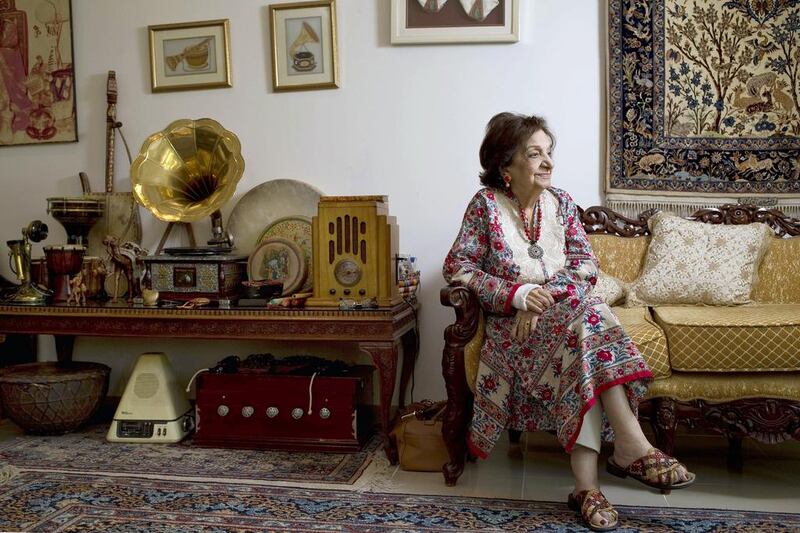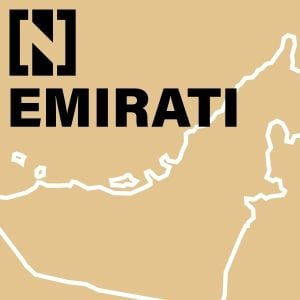DUBAI // When she was 7, Mariam Behnam’s grandmother took her to see a doctor because she wasn’t like all the other girls. She was always asking questions, and going out to climb trees and play marbles. The doctor told her grandmother there was nothing wrong with the child, but something wrong with everyone else.
Mariam Behnam has spent all her 93 years fighting to empower women. A second child, she was born in Iran into a family of Emirati pearl merchants.
Her family were expecting a boy. “A girl again, they said. I think that affected me as I grew up. Being the second child, and worse, a female, I wasn’t considered important.”
Her mother died when Mariam was only 10. Her grandmother raised her and her siblings. “I didn’t have a good relationship with my grandmother, we were always at odds. I disliked my older sister, she always obeyed and was scared of everything. I would always play tricks on her and scare her.
“I should have been born 50 years later,” she says, beaming a childlike mischievous grin. “I wanted to learn classical dance. So I would tell my grandmother I was going for Islamic studies, but I went to learn dancing.”
Mariam was the first woman to earn the post of cultural consul from the Iranian government in the 1960s, and cultural attaché to the Iran Cultural Centre in Lahore, Pakistan. She has published poetry in Farsi, Urdu and English, and is now senior adviser to the Dubai International Women’s Club.
At her home in Dubai all her possessions have a story, and none are there simply for looking good. The sitting room displays art and antiques from Persia, India, Pakistan and Arabia, all of her cultural influences; the room is a walk-in memoir.
“I realised what I wanted in life. I dreamt about it, I planned for it, and I spent all my effort to achieve it,” she says, suddenly full of energy. “The one thing I hate is wasting time.
“There needs to be a revolution in women’s thoughts.”
There is fire in her eyes, and passion in her voice. “Women are still not doing enough, they can do much more; they have to do much more. Don’t expect to have everything brought to you.
“What women say is law at home. How can you expect to ignore them? Besides, what do men do when they sit together? They talk about women.”
Education has always been Mariam’s favourite tool. Growing up she read any book she could find.
“I see these days that in some parts of the world history is starting to repeat itself. When I was young, there were no colleges for women; girls only studied to the sixth grade, but the boys went to university. Tell me, when they come back and marry, do the minds meet?
“Educate a man and you educate one person, but educate a woman and you educate a generation.
“She is looking after and raising the new generation. They will learn from her, carry on her knowledge and experiences.”
When Mariam was a child most girls were home taught, but she watched the boys going off to school and thought: “Why do only they get to be doctors and engineers and scientists? I fought to get into public school.”
She went on to obtain her master’s in English literature from Punjab University.
“Women are their own boss, they are in control today. Born bosses, even if they don’t go out to practise anything, they rule their four walls. But she has to believe in herself first.
“We have better mothers these days. They are more understanding, more giving, more vulnerable.
“I have a very good relationship with my granddaughters. I felt so proud when one of them introduced me to her friends, she thought I was worthy of that, to bring me into that circle.”
Mariam made Dubai her home 33 years ago. She loves to go to Bastakiya and trace her roots.
“I’ve been passing through Dubai for 80 years to get to other parts of the world. Life here for me has been very rewarding. I would never exchange this country for any other part of the world. They call this place Ardh Al Barakah, the blessed land.
“So many life changes in one life is not possible; I must’ve gone and come back,” she jokes.
But Mariam doesn’t feel as if she is done yet. She is working on her fifth book. “This one is also fiction, but as you know all fiction has its roots in fact.”
She is also trying to have her book Heirlooms, a collection of eastern folk tales, republished.
“I also wanted to write something about Dubai. If I am given the time, I would really like to do that. I’ve seen this place go through a metamorphosis from this small merchant city to a metropolis. I thank god that people have not lost their culture to be something else.”
Mariam says many people sell themselves short, and don’t release what they are capable of. “You have to be aware of your value. Always remember that you are important.”






